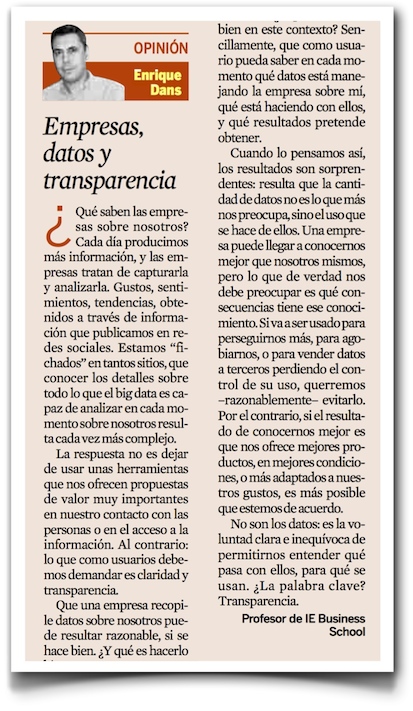- Business, data and transparency
 |
Business, data and transparency
|
My
expansion column this week is titled "Business, Data and transparency"
(pdf), and it aims to convey an idea for me fundamental: that it is not
about how much data a company collects about us, but of variables like
how to do it, the level of control that offers the user on that process,
the clarity in the reasons for the compilation of that data ,
transparency in the analyses carried out, and the final result that the
user or client perceives after the process. It is not so much collecting
data, but doing it well and being respectful.
Paradoxes
are clear: I can think of companies that, although they know about me
much more than what I can get to know about myself, only generate me as a
side effect that the publicity I receive is better adapted to my
interests, something that in principle I perceive as positive. And also,
let me decide at every moment what data I want to save, which I want to
remove, and offer me tools to do it myself in three mouse clicks. and
other companies that once I gave them some data, and from there and for
having done it, I call five hundred other companies different at
dinnertime to annoy me with products and services that do not interest
me. A management, that of the data and the information of the client,
that goes far beyond the rights arco and of the legal norms, and that
differentiates increasingly to the companies of the last century of
those of this century.
Then the full text of the column:
''Business, data and transparency
What
do companies know about us? Every day we produce more information, and
companies try to capture and analyze it. Tastes, feelings, tendencies,
obtained through information that we publish in social networks. We are
"signed up" on so many sites, that knowing the details about everything
that the big data is capable of analyzing at every moment on us is
becoming more and more complex.
The
answer is not to stop using tools that offer very important value
proposals in our contact with people or access to information. On the
contrary: what we as users must demand is clarity and transparency.
That
a company collects data about us can be reasonable, if done right. And
what is doing well in this context? Simply, as a user you can know at
every moment what data is being handled by the company about me, what
you are doing with them, and what results you intend to obtain.
When
we think about it, the results are surprising: it turns out that the
amount of data is not what worries us the most, but the use that is made
of them. A company can get to know us better than we do, but what we
really need to worry about is what consequences that knowledge has. If
it is going to be used to persecute us more, to overwhelm us, or to sell
data to third parties losing control of its use, we will — reasonably —
avoid it. On the contrary, if the result of knowing us better is that
it offers better products, in better conditions, or more adapted to our
tastes, it is more possible that we agree.
It
is not the data: it is the clear and unmistakable will to allow us to
understand what happens to them, what they are used for. The keyword?
Transparency.''
0 comentarios: